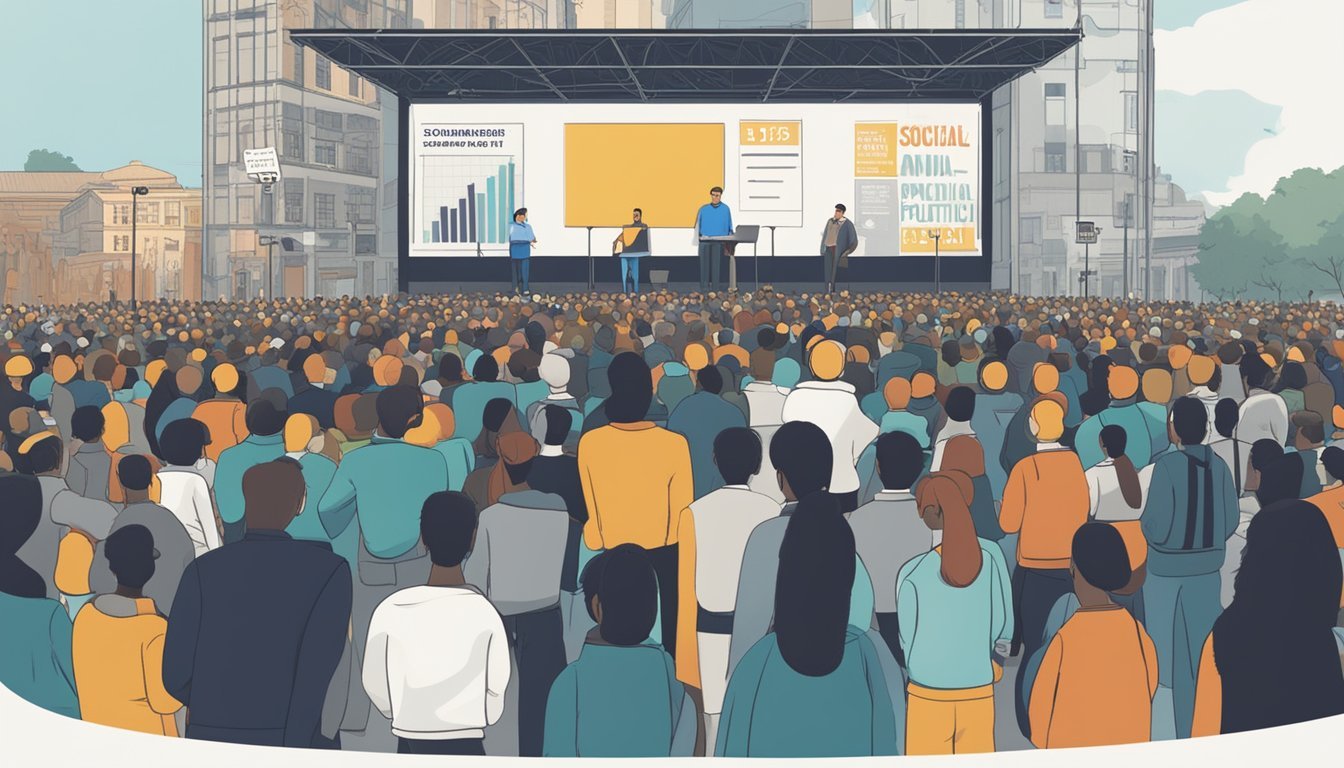Shocking Revelations: '13th' The Documentary That Exposes America's Hidden Racial Injustice!
"13th" is a powerful documentary directed by Ava DuVernay that examines the intersection of race, justice, and mass incarceration in the United States. Released on Netflix in 2016, the film takes its name from the 13th Amendment to the U.S. Constitution, which abolished slavery except as punishment for a crime. The documentary argues that this loophole has been exploited to perpetuate racial inequality through the criminal justice system.
DuVernay's work combines archival footage with interviews from activists, scholars, and politicians to present a compelling narrative about the evolution of racial oppression in America. The film traces a line from slavery through Jim Crow, the war on drugs, and modern mass incarceration, suggesting that these are all manifestations of the same systemic racism.
"13th" garnered critical acclaim and numerous accolades, including an Oscar nomination for Best Documentary Feature. Its thought-provoking content and innovative storytelling techniques have made it a significant contribution to the ongoing dialogue about racial justice in America.
Cinematic Details
"13th" employs powerful visual storytelling and expert interviews to explore the intersection of race, justice, and mass incarceration in America. The documentary's compelling narrative and artful presentation have garnered widespread acclaim.
Directorship and Creation
Ava DuVernay directed "13th," bringing her distinctive vision to the project. Her approach blends archival footage, news clips, and interviews with scholars and activists to create a visually striking and emotionally impactful film. DuVernay's use of stark statistics and historical context helps viewers grasp the complex issues at hand.
The documentary features a mix of talking heads, text overlays, and carefully curated visuals to maintain audience engagement. Music plays a crucial role, with a soundtrack that enhances the emotional weight of the content without overpowering it.
Reception and Critique
"13th" received overwhelmingly positive reviews from critics and audiences alike. The film holds a 97% approval rating on Rotten Tomatoes, indicating near-universal acclaim. Critics praised its incisive analysis and powerful storytelling.
Many reviewers highlighted the documentary's ability to present complex information in an accessible manner. The film's pacing and structure were lauded for maintaining viewer interest throughout its runtime.
Some critiques focused on the documentary's broad scope, suggesting it could have delved deeper into specific aspects of its subject matter. Nevertheless, most agreed that "13th" succeeds in its primary goal of educating and provoking thought.
Distribution and Availability
Netflix distributed "13th," making it widely accessible to a global audience. The film is available to stream in most countries where Netflix operates. Subscribers can watch the documentary online or download it for offline viewing.
"13th" includes subtitles in multiple languages, enhancing its accessibility to non-English speakers and the deaf and hard of hearing community. Audio description is also available for visually impaired viewers.
The film's presence on a major streaming platform has contributed to its impact and reach. It continues to be featured in Netflix's documentary section and often appears in "Trending" and "Social Impact" categories.
Historical Context
The 13th Amendment, slavery, Jim Crow laws, and the Civil Rights Movement are key elements in understanding the racial dynamics of mass incarceration in the United States. These historical factors laid the groundwork for systemic inequalities that persist today.
13th Amendment Overview
The 13th Amendment, ratified in 1865, abolished slavery and involuntary servitude in the United States. However, it included a crucial exception: slavery and involuntary servitude could be used as punishment for crime. This loophole allowed Southern states to maintain control over African Americans through criminalization.
The amendment's wording became a tool for perpetuating racial oppression. It enabled the creation of "Black Codes" and later Jim Crow laws, which disproportionately targeted African Americans for minor offenses.
Slavery to Mass Incarceration
After the Civil War, Southern states implemented laws criminalizing minor offenses. These laws primarily targeted African Americans, leading to their arrest and forced labor through convict leasing programs. This system effectively continued slavery under a new guise.
The practice evolved over time, contributing to the modern mass incarceration crisis. Racial profiling, discriminatory sentencing, and the War on Drugs disproportionately affected African American communities.
Statistics show that African Americans are incarcerated at more than five times the rate of whites, despite similar crime rates across racial groups.
Civil Rights Movement
The Civil Rights Movement of the 1950s and 1960s challenged racial segregation and discrimination. Key achievements included the Civil Rights Act of 1964 and the Voting Rights Act of 1965, which outlawed racial discrimination in public spaces and voting.
However, the movement faced violent opposition, including lynchings and police brutality. These events highlighted the deep-rooted racial tensions in American society.
Despite legal progress, systemic racism persisted in the criminal justice system. The "tough on crime" policies of subsequent decades exacerbated racial disparities in arrests, convictions, and sentencing.
Social and Political Impact
"13th" sparked intense discussions about racial inequality and mass incarceration in America. The documentary influenced public opinion and inspired activism around criminal justice reform.
Modern Civil Rights Advocacy
The film energized civil rights groups and sparked new advocacy efforts. Black Lives Matter and other organizations used "13th" to educate supporters and recruit new activists. Many viewers were compelled to take action after learning about systemic racism in the justice system.
Screenings and discussion groups formed across the country. College campuses held events to examine the documentary's themes. Some activists created petitions and letter-writing campaigns targeting lawmakers.
The increased awareness led to more protests against police brutality and racial profiling. Calls for reforms like ending cash bail and mandatory minimum sentences grew louder.
Political Response and Legislation
"13th" put pressure on politicians to address mass incarceration. Some lawmakers cited the film when proposing criminal justice bills. At the federal level, the First Step Act of 2018 included sentencing reforms and expanded rehabilitative programs.
Several states passed laws to reduce prison populations. California ended cash bail. New York reformed discovery rules to make trials fairer. Florida restored voting rights to many people with felony convictions.
Not all political reactions were supportive. Some officials disputed the documentary's claims or defended tough-on-crime policies. Overall, "13th" helped shape the political discourse around these issues.
Role of Politicians and ALEC
The documentary highlighted how politicians and special interests shaped criminal justice policies. It criticized both Democrats and Republicans for supporting punitive laws that increased incarceration rates.
"13th" drew attention to the American Legislative Exchange Council (ALEC). This conservative group drafts model legislation, including many "tough on crime" bills adopted by states. The film argued ALEC prioritized corporate profits over justice.
Some politicians distanced themselves from ALEC after the documentary. Others defended the organization's work. The increased scrutiny led ALEC to scale back its criminal justice task force.
Cultural Significance
"13th" sparked widespread dialogue about racial injustice and mass incarceration in America. The documentary illuminated historical patterns of oppression and their modern manifestations, reshaping public understanding of these critical issues.
Influence on African American Narratives
"13th" amplified African American voices in discussions of racial inequality. It highlighted the enduring impact of Jim Crow laws and their evolution into contemporary forms of discrimination. The film provided a platform for scholars, activists, and formerly incarcerated individuals to share their perspectives.
Many viewers gained new insights into the systemic challenges faced by African Americans in the justice system. This increased awareness led to more nuanced conversations about race in America.
Public Perception and Criticism
The documentary received acclaim for its thorough examination of complex issues. Critics praised its use of historical footage and expert interviews to build a compelling argument.
Some viewers found the film's content challenging, as it confronted long-held beliefs about crime and punishment. This discomfort sparked debates in various forums, from social media to academic circles.
"13th" also faced criticism for its focused narrative. Some argued it overlooked certain aspects of criminal justice reform. Despite this, the film's impact on public discourse remained significant.
Critical Analysis
"13th" presents a compelling examination of the U.S. criminal justice system, highlighting racial disparities and the evolution of mass incarceration. The documentary employs various narrative techniques to convey its message effectively.
Examination of the Prison System
The film scrutinizes the prison-industrial complex, revealing its economic motivations and societal impacts. It exposes how prisons have become profit-driven enterprises, often at the expense of rehabilitation and justice. The documentary draws connections between the 13th Amendment's loophole and the perpetuation of involuntary servitude within the prison system.
Private prisons and their lobbying efforts are highlighted as key factors in the U.S. prison boom. The film presents statistics and expert testimonies to illustrate the rapid growth of the prison population since the 1970s.
"13th" also explores the concept of convict leasing, demonstrating how this practice extended the exploitation of African Americans beyond the abolition of slavery.
Analysis of Racial Disparities
The documentary provides a detailed analysis of the disproportionate impact of mass incarceration on African American communities. It traces the historical roots of this disparity, from Jim Crow laws to the War on Drugs.
Statistical data is presented to show the overrepresentation of Black individuals in the prison population. The film argues that this imbalance is not coincidental but a result of systemic racism and targeted criminalization.
"13th" examines policies like mandatory minimum sentences and their role in perpetuating racial inequalities within the justice system. It also explores media representation and its influence on public perceptions of crime and race.
Narrative and Persuasive Techniques
The documentary employs a mix of historical footage, interviews, and infographics to build its argument. Expert testimonies from scholars, activists, and politicians lend credibility to the film's claims.
DuVernay uses powerful visual metaphors, such as animated statistics and archival images, to illustrate complex concepts. The film's pacing and editing create a sense of urgency around the issues presented.
Music plays a significant role in setting the tone and emotional impact of key scenes. The use of hip-hop lyrics as chapter markers ties the narrative to contemporary cultural expressions of racial injustice.
Contemporary Relevance
Ava DuVernay's "13th" remains highly relevant in today's social and political climate. The documentary's exploration of systemic racism and mass incarceration continues to resonate, sparking discussions on racial inequality and criminal justice reform.
The War on Drugs and Crime
The "War on Drugs" initiated in the 1970s remains a contentious issue. "13th" highlights how this policy disproportionately affected communities of color. Statistics show African Americans are incarcerated at higher rates for drug offenses despite similar usage rates across racial groups.
Critics argue the War on Drugs perpetuates racial disparities in the justice system. Some states have begun reforming drug laws, decriminalizing or legalizing certain substances. These changes aim to address the racial inequalities exposed in "13th".
Law enforcement practices like stop-and-frisk have faced increased scrutiny. Many cities have revised policies to combat racial profiling.
Shifts in Social Justice Movements
"13th" has influenced contemporary social justice movements. The film's insights on systemic racism have informed groups like Black Lives Matter.
Activists use the documentary to educate and mobilize supporters. It has become a valuable resource in discussions on police reform and prison abolition.
Social media campaigns often reference "13th" when addressing racial inequality. The film's analysis of the prison-industrial complex has sparked debates on private prisons and inmate labor.
Some politicians have incorporated themes from "13th" into criminal justice reform proposals. These include sentencing reforms and alternatives to incarceration.




